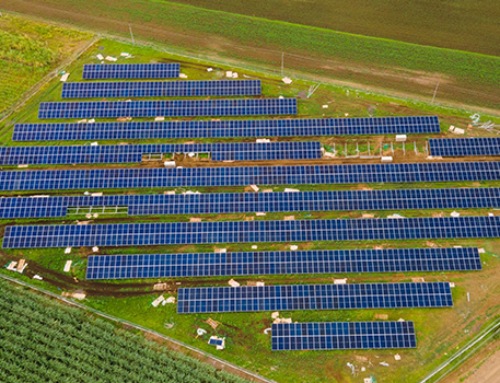

Getting solar panels means you are free from the grid, right?
Wrong!
Most solar projects in India are grid-tie solar installations. This means, the solar power systems work alongside the electricity grid. Unlike battery-based systems, you cannot store energy in these types of plants. But, you can export your excess energy into the grid and be compensated for it.
Your monthly billing cycle will depend on your metering system.
Solar Metering Types in India
Indian DISCOMs offer two primary types of metering options: net and gross. Net metering has also spawned another kind of system called net billing. Let’s understand the difference between the three with an example.
Assumption:
A rooftop solar consumer has an electrical load of 15kW. To take care of his energy needs, he has installed a grid-tie solar power plant with a capacity of 10kW. During the daytime, he generates 2kW of excess power that can be exported to the grid. Further, he pulls 7kW of electricity from the utility grid.
The metrics will look something like this:
Electrical Load: 15kW
Solar Capacity: 10kW
Imports from the grid: 7kWh
Exports to the grid: 2kWh
Without the solar plant, the consumer’s electrical bill (@₹8/unit) would amount to 15×8= ₹120 Here’s how different metering systems for the solar power system would affect his savings.
Net Metering
Net metering is the most lucrative option for a solar consumer in India. With this system, the value of electricity you export to the grid is the same as what you import from the grid. The bill calculation would be based on the net value, i.e. import exports.
From the above assumption,
Net value= 7kWh- 2kWh = 5kWh
Billing: ₹8 x 5= ₹40
Savings: 120-40= ₹80
Net metering has multiple benefits.
• High savings
• No requirement for a storage system
• Shorter payback period
Many states in India offer net metering facilities for up to 1 MW solar capacity. However, there are two primary requirements that the government imposes on all those availing this facility:
1. The consumer has to install a net meter (a bi-directional meter) that records the imports and exports.
2. The solar panels used in the plant should be domestically manufactured.
Gross Metering
In a gross metering system, a consumer cannot directly use the energy produced by solar panels. Rather, the produced power gets exported to the utility grid, at a fixed rate (feed-in tariff). To meet his energy load, the consumer will draw the required electricity from the grid at the usual electricity rate (retail tariff).
In the bill, the value of exported solar energy will get deducted.
So in the example above, if the consumer draws 15kW of power from the grid priced at ₹8= ₹120
The DISCOMs buy the energy exported to the grid at say ₹3/unit= 10kWx 3= 30
Billing: ₹120 – ₹30= ₹90
Savings: ₹30
The minimum solar power capacity required to avail gross metering is 10kW. It is ideal for those businesses and private developers that install solar plants, not for self-consumption but for the sale of energy.
Though a system like gross metering reduces a consumer’s savings, it was introduced to benefit both the consumer and the supplier of electricity.
DISCOMs argued that the electricity tariffs include other business expenses like transmission costs, and net metering overvalued consumers’ excess energy. Moreover, power distribution companies cannot continue operations without generating revenue, which will ultimately affect the entire power infrastructure.
Gross metering not only allows consumers to save money but also allows electricity suppliers to continue generating revenue.
Net Billing
Net Billing and net metering are largely alike. The only difference? The value of exported energy is priced at a lower rate in the net billing system. Precisely, if the government charges ₹8/unit for the energy you pull from the utility grid, it pays you ₹3/unit (assumption) for the energy you export to the grid.
The savings are lower than the net metering but higher than that in gross metering.
From our example,
Value of energy imported from the grid: ₹8 x 7kWh= ₹56
Value of energy exported to the grid= ₹3 x 2kWh = ₹6
Billing: ₹56- 6 = ₹50
Savings: ₹120- ₹50 = ₹70
| Type of Metering | Bill Amount | Savings |
|---|---|---|
| Net Metering | ₹40 | ₹80 |
| Gross Metering | ₹90 | ₹30 |
| Net Billing | ₹50 | ₹70 |
Prevent Devaluation of Your Energy
Be it net metering, gross metering, or net billing, you will save money on your energy bills by going solar. However, since your generated solar energy is valued differently in each system, the savings on your monthly electricity bill will also differ.
You can also prevent the devaluation of your energy by consuming most of it when it is produced. If your power consumption during the day is high, it will reduce the possibility of excess energy. If the maximum power is consumed during the night, go for a lower-capacity solar system.
How Can We Help?
Ornate Solar is India’s leading solar company with 10 years of experience. By partnering with the best-in-class global solar brands, we bring the most reputed solar panels, inverters, and solar accessories to you and make your shift to solar cost-effective and easy.
We have also developed India’s first Integrated InRoof system, which turns solar panels into the roof and eliminates the need for sheet roofing.
We deliver across India.
For more information, please give us a call at 1800 2026 252.














Leave A Comment